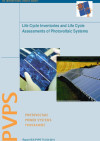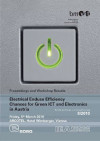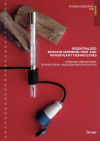Suchergebnisse
Life Cycle Inventories and Life Cycle Assessments of Photovoltaic Systems

IEA-PVPS Task 12, April 2015
Herausgeber: IEA Photovoltaic Power Systems Programme
Englisch, 86 Seiten
Downloads zur Publikation
4th Industry Workshop "Advanced Lighting Solutions for Retrofitting Buildings"
29. September 2014
Fukuoka, Japan
Topic of this workshop was retrofitting of lighting solutions in non-residential buildings
Elements for implementation of the Model region for Smart Grids in Salzburg: Consumer to Grid and Building to Grid - Last Demand Side Management
Electrical Enduse Efficiency Chances for Green ICT and Electronics in Austria

Schriftenreihe
08/2010
Michael Hübner, Ao. Univ. Prof. Dr. Wolfgang Wimmer, DI Marcus Hofmann
Herausgeber: BMVIT
Englisch, 172 Seiten
Downloads zur Publikation
GAINING BUILDING LAND without expansion - development of single-family housing settlements

Identifying and utilising potentials for higher densities and re-structuring in single-family housing areas requiring renewal
Field test of a virtual power Plant comprising 30 pellet-boiler fired micro-CHP modules
A virtual biomass plant comprising 30 micro-CHP-Modules, each of them integrated into an existing pellets-boiler in the Austrian region of eastern Styria is to be tested. The goal of this project is to gain experience and to introduce a new sustainable technology.
Urban consolidation Lehen - Subproject 1: Fundamental study for an intelligent e-monitoring
The goal was to refine the energy monitoring for residential buildings as well as to find possibilities to visualise the energy consumption and continuously compare it with the "target consumption" in order to get a signal in time and thereby to be able to communicate it to the users. Different monitoring systems were investigated and the experience was evaluated.
Waste heat utilisation and use of renewable energy sources in a metal-working enterprise
Use of waste heat and covering of the remaining energy demand by the renewable energy sources hydropower and biomass in a metal-processing company.
Regional acceptance of biogas power plants - suitability and availability of energy-plants
Development of an calculation tool for future biogas power plant operators and planners to check the regional acceptance of their power plants as well as possible energy-plants and their availability.
HOTSPOTS - Holistic thermographic screening of urban physical objects at transient scales
HOTSPOTS enables new insights and perspectives for city development. According to the project idea innovations in acquisition and sensing as well as densification of geo-referenced city related data are supplemented by novel processing chains in city data analytics. Driven by an integrated scientific approach we develop a novel method in the selection, evaluation and prioritization of infrastructural city development measures which is directly derived from sensed data hence reducing the risk of ad-hoc decisions or lack in impact.
KOMEOS - Konzeption von Modellen multifunktionaler Energiezentren für die Ost-Steiermark
Within the region of East-Styria a variety of so-called regional multifunctional energy centers have been designed for selected location which can be characterized by generating renewable energy and additional products or services. Identification of optimum set-up of energy centers. General recommendation for implementation.
An innovative approach for facades with optimised noise protection and natural ventilation
The aim of this project was to advance the state of the art in the engineering of double-leaf building facades that facilitate natural ventilation while providing sufficient sound insulation. Realization of natural (window) ventilation is in some instances difficult due to a number of factors. Thereby, noise pollution (especially traffic noise) plays an important role. To address these issues, the project explored innovative solutions in terms of facade constructions for concurrent natural ventilation and noise control.
CombiSol: solar combisystems for houses, state-of-the-art and potentials for improvements
Evaluation of the quality and efficiency of state-of-the-art installed solar combisystems, potentials for improvements and measures to increase the quality
SüdSan - Socially acceptable, climate-compatible refurbishment of two multi-family-houses as a model for the refurbishment of the Südtiroler-Siedlung Bludenz
Planning, energetic-economic optimisation, construction and monitoring of the costs, comfort and energetic performance of two socially acceptable and climate-target-compatible refurbished smaller apartment buildings in the Südtiroler-Siedlung Bludenz.
IQ - focal point on information and networking in the field of energy efficient districts
Energy aspects on land use planning were worked up on the basis of research and demonstration projects in Austria, Germany and Switzerland. The target groups from administration, politics, architecture as well as developers and future dwellers were addressed with custom-made events.
Sol2Pump - High efficient combination of solar thermal plants, photovoltaic and heat pumps
Targeting a high level of decentralised energy supply on basis of renewable energy, the project analysed the possible combinations of solar thermal energy, photovoltaic and heat pumps. The project aimed to maximise the domestic energy supply due to utilisation of the building as short term energy storage. In addition to that, several optimisation measures had been developed. The impact on the energy supply and demand will be economically assessed through life cycle costing. On this basis, the potential load transfer and the use of this kind of systems had been evaluated in combination with smart grids.
LowEnergyBuildingServices - Highly efficient presence detectors and end user technologies
Highly energy efficient presence detectors, control systems for sun shades etc. are de facto not available on the market. Regarding plus-energy office buildings, the minimisation of the power consumption of these components is a central criterion to achieve the "plus" part in terms of the energy of the building. A highly energy efficient presence detector was successfully sketched in this project, which undercuts the intended standby consumption of 0,05 W.
New market potential for Wood Plastic Composites by applications for injection moulding
Wood Plastic Composites (WPC) should gain new market potential and create new value via applications in injection moulding. Therefore it is necessary to develop a formulation suitable for injection moulding to access the existing market potential.
Health and Safety Aspects of Solid Biomass Storage, Transportation and Feeding

Englisch, 100 Seiten
Decentralized Biomass Combined Heat And Power Plant Technologies

Potential applications, technological and economic evaluation
Forschungsforum
2/1999
Herausgeber: BMVIT
Englisch, 6 Seiten
